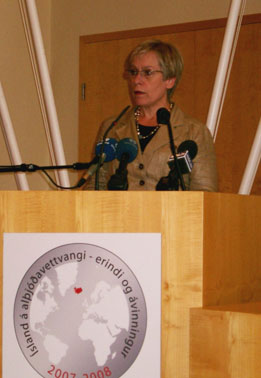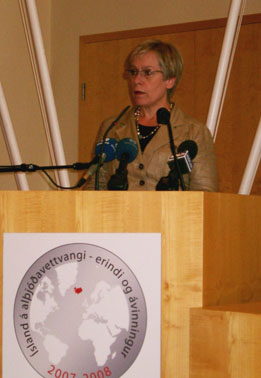International Cooperation in the 21st Century and the United Nations Security Council
International cooperation in the 21st century and the United Nations Security Council
Address by Mrs. Ingibjörg Sólrún Gísladóttir, Minister for Foreign Affairs, University of Iceland
7 September 2007
Check against delivery
University Rector, ladies and gentlemen,
It is special pleasure for me to address this gathering at the University of Iceland on international cooperation in the 21st century and the United Nations Security Council. I thank the University and other Icelandic universities for their favourable response to the idea that extensive debate should take place in the months ahead on Iceland’s role in the wider world, and the opportunities it yields.
In my view the government should hold more events in consultation with Iceland’s excellent universities. During a useful meeting with all eight rectors of Iceland’s universities earlier this week, we realized that this symposium probably represents the first time that Iceland’s universities are joining forces with the government in this way. We were in full agreement that our universities should pool their collective resources and work together to strengthen Iceland’s role in the wider world and we should see ourselves as allies in the demanding task of preparing our young people for life in the 21st century.
Iceland’s universities are diverse yet complementary, as witnessed by the wide-ranging themes and topics of the forthcoming symposium series. Each university approaches the theme of Iceland in the Wider World – Responsibilities and Opportunities from its own perspective and in light of its priorities and specialization. This seminar, or symposium as I prefer to call it, is important for the government, for the academic community, and for the Icelandic people. This discussion is necessary in the sense that informed and impartial debate is a prerequisite for consensus and comprehension of government policies at any time, whether in international affairs or in other fields. After all, there are few things more dangerous than a government isolated from its people.
The Prime Minister mentioned in his address that Iceland’s decision to run for a seat on the Security Council reveals a new vision, and a new confidence and vigour in foreign affairs; it was not an indicator of vanity or arrogance, but of a re-evaluation of the quest to strengthen Iceland’s position in the international arena. The Prime Minister and I are in full agreement on this point. The Þingvellir Declaration, promulgated by the present government, states that Iceland is to take the initiative in international fora. We are also in agreement that on both ethical and political grounds Iceland cannot, and must not, evade its responsibility of being an active participant in the community of nations.
The world is changing more and more rapidly, and the reality we see today is very different from the one our parents grew up with. Far more opportunities exist for students today than when I was a student here, although even in those days I felt that the world was my oyster. For young university students today, employment opportunities span the entire world; and it is our job, the job of politicians, to ensure that Iceland offers exciting prospects for these young and talented people.
Iceland is living evidence of rapid change. There can be few peoples in the world who have progressed so fast from destitution to affluence, from superstition to enlightenment, with such a massive leap forward in the application of technology and knowledge. It is a great privilege to be a member of such a society. And with abilities comes responsibilities. Only a handful of nations on earth have a higher per capita income or a higher standard of education, and few if any have been more successful in the utilisation of renewable energy.
The story of how a poverty-stricken colony in the northern ocean transformed itself in a single lifetime into a highly developed welfare society provides inspiration to many nations which live in poverty. I am delighted to participate in developing Icelandic cooperation with other nations based upon the specialised knowledge we have accrued.
The progressive government led by the Prime Minister and me, each through our respective party, has the objective of seizing opportunities for the betterment of the nation, opening up borders by actively participating in international cooperation ventures, and fulfilling our social obligations to the outside world. Our candidature to the Security Council is one aspect of this, but it also entails a vision for the world’s small states that clear rules apply and must be observed in the conduct of international relations. We have affirmed our commitment that human rights, along with development cooperation and an emphasis on the peaceful resolution of conflicts, are to be the new cornerstones of Icelandic foreign policy. Iceland also aims to take the lead in efforts to combat ocean pollution and in international measures to respond to climate change. Guided by these principles – a clear policy grounded in courage and responsibility – the whole world is indeed our oyster.
The role of the United Nations Security Council has changed dramatically since the end of the Cold War. With the demise of the Soviet Union, the Security Council may be said to have undertaken a new role, which is still evolving. The two superpowers no longer call all the shots and the Security Council’s potential for influence has increased steadily. Instead of conflict, the focus has increasingly shifted to collaboration and careful decision-making. Today, regardless the issue, the veto power is rarely exercised in the Security Council. The nature of the issues considered by the Council has also changed. Conflict within national borders, civil war and even genocide are now on the Council’s agenda. Other issues, such as the plight of women and children during armed conflict, terrorism, and the role of energy and environmental security, are regularly discussed in the Council.
The advent of a new world order has seen the United Nations adapt in various ways. Its role is not simply to separate warring parties, but also to assist in strengthening measures to prevent conflict. This fundamental alteration, which is reflected in the work of the Security Council, has enhanced the potential of small states to have an influence within the Council. Smaller nations are now more able to bring issues to the Council and to gain the attention of the international community, and indeed they are experiencing threats to their security no less than larger nations.
The Security Council grapples with challenges which arise when the autonomy of nations and ethnic groups is threatened, when human rights and personal liberties are under attack, and when security is directly or indirectly undermined. A new understanding of today's threats is spreading: for example a new report from the United Nations Environment Programme on the situation in Darfur in war-torn Sudan clearly delineates how the natural environment, poverty and rising population are at the root of conflict and appalling suffering. The report warns of the strong link between environmental impacts, desertification and conflict. This tells us that a consensus is emerging for the need to see sustainable development as a prerequisite for sustainable peace.
New threats demand new solutions. Climate change is an increasing threat to the very existence of people and nations. There is no longer any controversy among scientists and other experts on whether climate change is a real threat faced by mankind. Instead, they now debate how many years – or how few years – we have left to respond by practical measures in order to prevent a terrifying scenario which will no doubt have an impact on every nation on earth.
Wherever I go in the world, I am aware that Icelanders are respected for achieving of a goal that most nations can only dream of; to shift from an energy system based on oil and coal to one based on renewable energy resources. When I was growing up in the Vogar district of Reykjavík, the houses had oil-fired heating and oil was widely used to generate electricity. When my parents were growing up, the main fuel source was coal. Now all our electrical power is generated from green resources, and 70% of all of Iceland’s energy derives from renewable resources. This is unique in the world. Today in many countries, energy and security are closely interlinked, and nations’ access to adequate energy is defined as a security issue. The threat posed to humanity by climate change also demands new solutions and a new outlook on security issues. In this context we have much to offer, although our expertise and experience has to date not been fully utilised. Many nations see the Icelanders as their allies in enhancing usage of geothermal resources where they exist. Like other small nations, we do not constitute a threat to anyone: no-one suspects us of having a hidden agenda in cooperation with other nations – we are their objective and non-partisan allies in dealing with the challenges of the 21st century.
Icelanders have hitherto not seen themselves as active participants in the field of peace and security. We must realise that in the new world of today the size of one’s territory or economy does not necessarily determine what a nation can offer to the international community. We should not approach the tasks that face us today with any sense of inferiority. The right combination of confidence, optimism and realism yields the best results.
Ladies and gentlemen
Our changed world means great opportunities and challenges for a small nation such as Iceland. Knowledge, expertise and ingenuity are the most important currency in international relations. We increasingly possess these, and on that premise we should unashamedly stamp our mark. I enjoyed a poignant conversation with a lady in my local shop the other day, who said that of course we should try to get to the “high table” of international politics, and that not seeking a seat on the Security Council would be like being in a political party which did not want to be in government!
I would like to point out that of the 192 member states of the United Nations, just under 100 are classified as small states; of these, nearly 40 are small developing island nations. It is not so long since Iceland shared the developing country label and comparable features of such nations, but in record time it has achieved such economic progress that it is now among the world’s most developed countries. The United Nations should, in my view, reflect the diversity of the states which have united under its aegis.
I reiterate my thanks for this meeting; I thank the Rector for inviting me, and for the ambitious programme which will involve faculty and students in many ways during the coming academic year. My hope is that we are at the beginning of an important process of dialogue and debate which will be manifested within our universities, our bonds between scholarship and government policy in the field of international affairs and our collective responsibilities and opportunities in the wider world.


